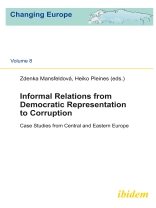Informal relations have been one of the major research topics of the social sciences since the 1990s. In order to allow for meaningful comparisons between different combinations of the positive and negative effects of informal relations on democratic representation, this book is focus on post-socialist Central and Eastern Europe as a particular region where formal democratic rules have been established, but competing informal rules are still strong. A broad spectrum of related analytical concepts is discussed from different perspectives and from different academic disciplines, then empirical cases of the relationship between informal relations and democratic representation are analyzed. The contributions span the whole continuum, as we perceive it, from civil society networks seen as supporting democratic representation to the perversion of democratic representation through political corruption. The final part of the book takes a closer look at corruption through four case studies from Russia.
लेखक के बारे में
Dr. Heiko Pleines is head of the Department of Politics and Economics of the Research Centre for East European Studies (Forschungsstelle Osteuropa) and lecturer in comparative politics at the University of Bremen, Germany. His major research interest is the role of non-state actors in political decision-making processes and the resulting impact on political regimes.
Dr. Zdenka Mansfeldová is a senior researcher and head of the Department of the Sociology of Politics of the Institute of Sociology, Academy of Sciences of the Czech Republic. Her research focuses on political institutionalization and the representation of interests in both political terms (parties and parliament) and the non-political mesostructures of social interests.












